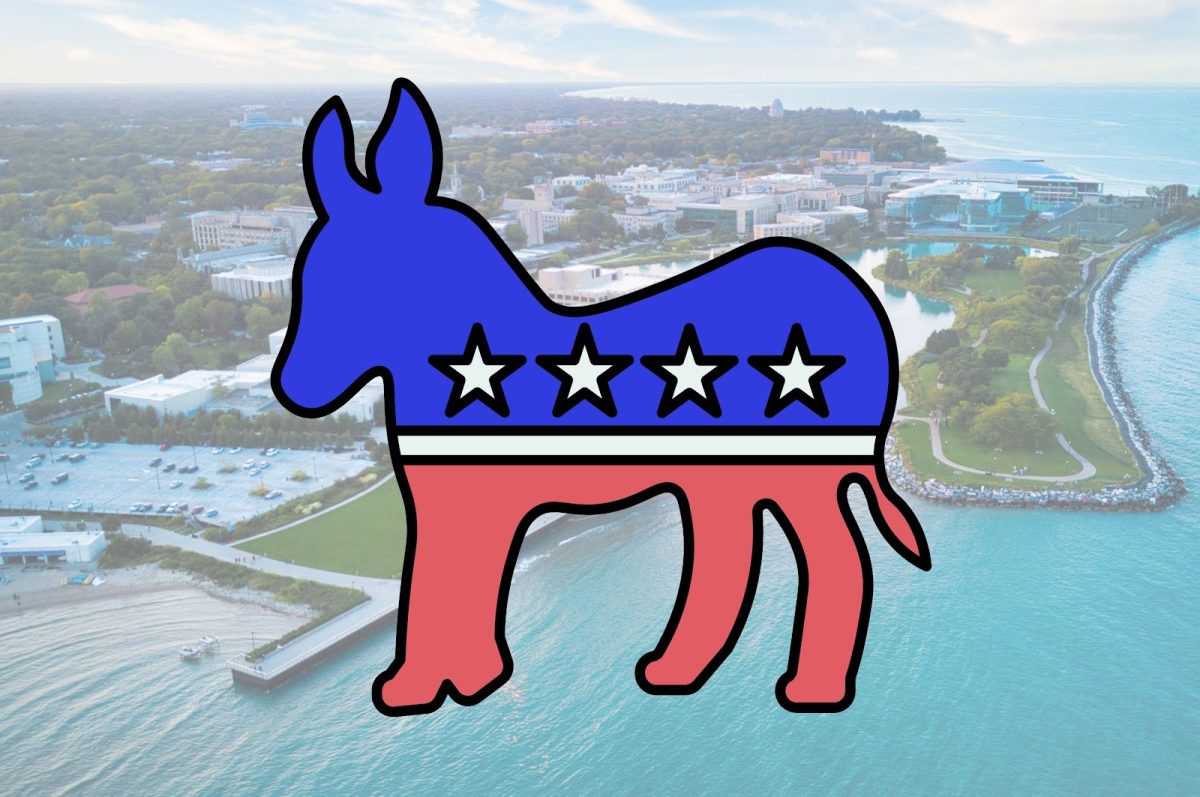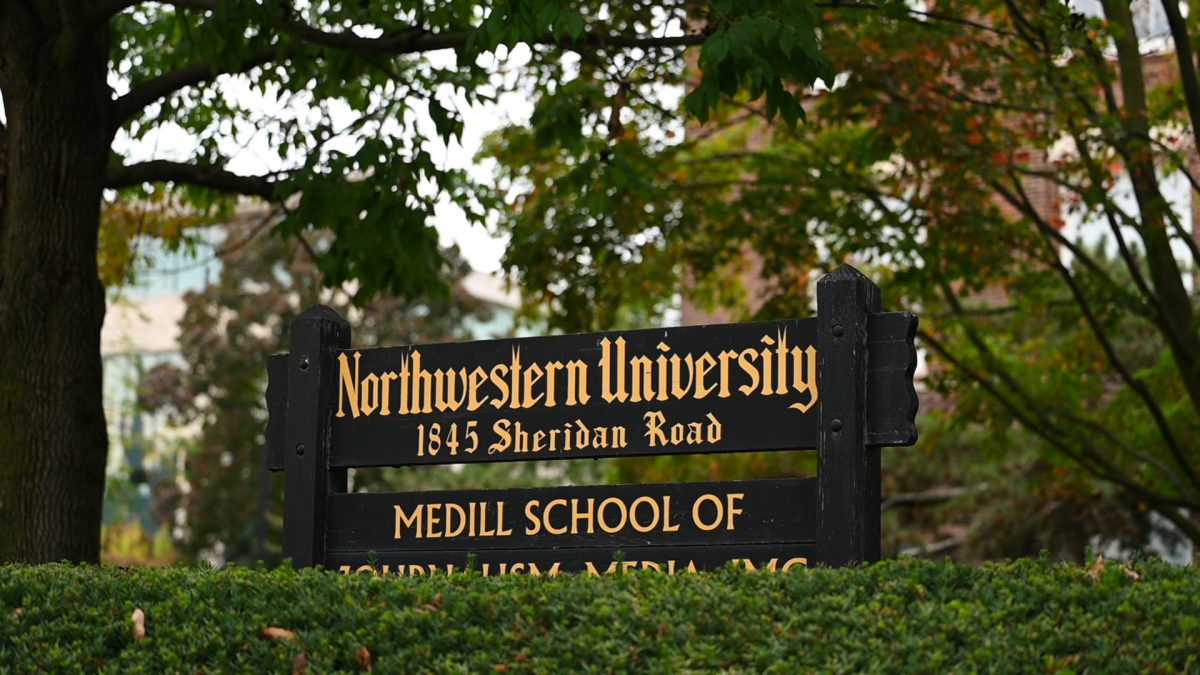Clouds formed as a group of protesters, led by Northwestern’s chapter of Students for Justice in Palestine, gathered underneath a tree at Evanston’s Tallmadge Park on Tuesday afternoon. As the protesters left the park for campus at about 2:30 p.m., a light rain began to fall. Undeterred, the demonstrators marched down Sheridan Road toward The Arch.
They chanted, “Free, free Palestine,” and took two Palestinian flags and a white flag reading, “This is GENOCIDE” with them.
When demonstrators arrived at The Arch, they encountered around 15 University Police officers and Cook County sheriff’s deputies on both sides of the street. Several officials from NU Student Affairs also observed the event.
NU’s chapter of Jewish Voice for Peace — the University’s only registered undergraduate group dedicated to pro-Palestinian activism — criticized NU’s response to the protest in a statement to The Daily.
“JVP stands in solidarity with the efforts of SJP to conduct popular education around Palestinian liberation in the face of an ever-escalating genocide,” JVP said in the statement. “We condemn the overwhelming police presence on campus and the university’s fascist threats of arrest in response to a peaceful and educational event.”
SJP titled the event “The Popular University,” a reference to a movement at the University of Chicago to honor the one-year anniversary of its encampment. NU’s rendition, which lasted from 11 a.m. to 6 p.m., was intended to include “teach-ins, skill shares, mutual aid, food and more,” all outside 1838 Chicago Ave., according to the group’s Instagram.
That was before Dean of Students Mona Dugo emailed the group Monday evening, informing SJP that event flyers posted around multiple dorms violated the University’s display and solicitation policies. She added that NU deemed the event unauthorized and that holding it on University property “will be considered trespass and result in University discipline and/or arrest.”
In the morning, University Police began to amass by 1838 Chicago as a fence surrounded the lawn between the dorm and Scott Hall. Police began checking students’ identification in Scott Hall, preparing to meet SJP protesters.
Four hours before walking down Sheridan, about 25 attendees gathered at Tallmadge Park to host a dialogue about their goals for the day and to train protesters in resisting attempted arrests and other potential retaliation from police.
When they arrived, the demonstrators stayed on the public sidewalk in front of The Arch to avoid the threat of arrest.
SJP, University Police, the Cook County Sheriff’s Office, NU Student Affairs and the Chicago chapter of the National Lawyers Guild — an organization of lawyers and law students that aims to protect human rights, which mobilized legal observers at the demonstration in preparation for confrontation with police — declined to comment.
Around 1 p.m., Geri Cohen, a mother of an NU freshman and a member of the Coalition Against Antisemitism at Northwestern, waited at 1838 Chicago for the protesters to show. Erica Freeman, a Glencoe resident and mother of a UCLA student, accompanied Cohen. The pair departed shortly after, due to the rain.
Cohen returned after the protesters finally walked to The Arch.
“We are standing here today as community members demanding that universities do more,” Cohen said. “I’m glad to see there is security and there are barriers put up, but I’m disheartened by the idea that we’re still standing here talking about it 20 months (after Oct. 7, 2023).”
Shortly after 3 p.m., demonstrators chanted at The Arch, shouting phrases such as: “Hey Northwestern, what do you say? How many kids have you killed today?” After about one hour, they sat in a circle by The Arch to participate in workshops with several local activists on the time, space and tactics of successful organizing.
Demonstrators discussed how NU students could connect with activism movements off campus in the future.
While SJP carried out its programming by The Arch, several drivers honked in support of the demonstrators, while others shouted insults. Meanwhile, some professors, including history Prof. Helen Tilley, watched from a distance.
“I am amazed that the University is repressing discussion about a topic that is so important and should be discussed openly and freely by making it against the rules to even hold a teach-in about these issues,” Tilley said. “It creates the impression that these students are doing something outlandish when they’re not.”
After the workshops concluded and as protesters were packing up, Cohen approached several of them. They spent at least 15 minutes discussing the impact of pro-Palestinian protests on campus dialogue — especially between pro-Palestinian and pro-Israeli students — and the relationship between pro-Palestinian activism and antisemitism.
Both the protesters and Cohen agreed that this year, it has been harder for people to have a conversation about the Israel-Hamas war. JVP told The Daily in a statement that the high levels of security on campus made it a “less safe environment” for students.
“Northwestern University once again demonstrates a shameful prioritization of appeasing the pressures of congress, the Trump administration and Pro-Israel voices over the physical safety and academic freedom of its own students,” JVP told The Daily.
Nineth Kanieski Koso, David Samson, Marissa Fernandez, Emily Lichty and Sasha Draeger-Mazer contributed reporting.
Email: [email protected]
X: @IsaiahStei27
Bluesky: @isaiahsteinberg
Email: [email protected]
Bluesky: @aknewsom.bsky.social
Email: [email protected]
Related Stories:
— One Year Later: NU reflects on pro-Palestinian encampment that changed student activism







